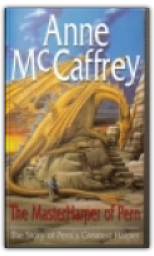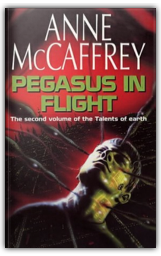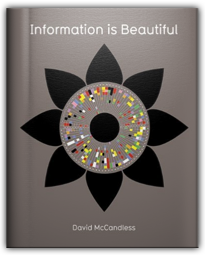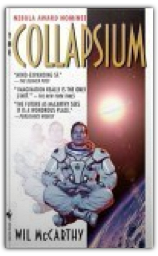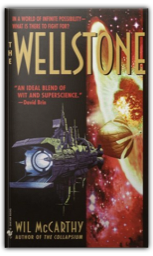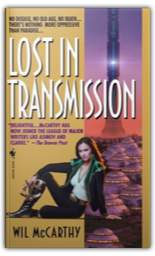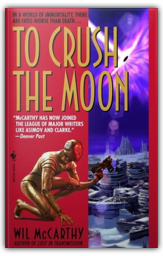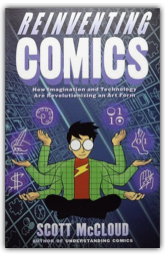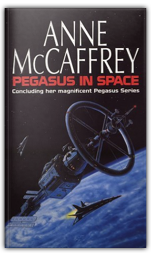 Pegasus in Space
Anne McCaffrey
Pegasus in Space
Anne McCaffrey
Anne McCaffrey is best known for the Dragonriders of Pern, but her loose "Talents" SF series about superpsychics has been running almost as long. This began with the near-future (1973), To Ride Pegasus continuing a couple of generations later in Pegasus in Flight (1990). Book two introduced a crowd of new characters, notably the paralysed boy Peter whose telekinetic talent can not only move his body without help from his ruined nervous system, but—with practice—even lift payloads into orbit. 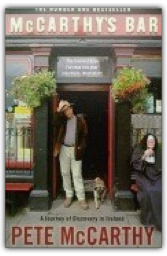 McCarthy's Bar
Pete McCarthy
McCarthy's Bar
Pete McCarthy
The premise of Pete McCarthy's first book, McCarthy's Bar, is that you should never pass up the opportunity of having a drink in a bar that shares your name. There is clearly more to this plan than the obvious publicity stunt, since it could work with books as well—try reading Cormac McCarthy after reading this hilarious, informed and intelligent book, and you may well be tempted to buy books by every other McCarthy around. 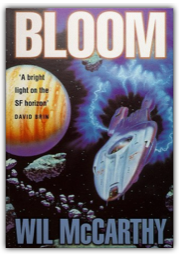 Bloom
Wil McCarthy
Bloom
Wil McCarthy
One day, late in the 2090s, a new form of life—a galloping fungal growth—blooms in New Guinea and, within days, devours Earth and most of its inhabitants. Within years, it has permeated the inner solar system and gobbled four planets—the few survivors of the Evacuation sit in bases in the asteroids and the moons of Jupiter waiting for the Bloom to mutate again, to cope with the cold of the outer system, or for the enthusiasts who worship it to let it loose among them. And reporter John Strasheim is asked to go with an expedition back to Earth, supposedly to plant monitors, and to test new defences. Much of the power and suspense of this high-grade SF thriller comes from claustrophobia—a crew of six in a cramped space and one of them at least a traitor. Strasheim is an engaging narrator, a cynic with a heart of gold, who cares more passionately than he thinks for the future of humanity. Two colonies—uptight Ganymede and relaxed cyber-hedonist Port Helier—are nicely contrasted. And, because this is the sort of book it excellently is, we know that, in all sorts of ways, things are not what they seem. —Roz Kaveney 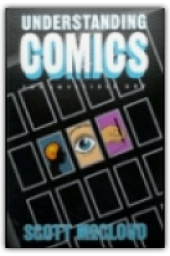 Understanding Comics
Scott McCloud
Understanding Comics
Scott McCloud
As all good card-carrying comic-book fans know, their sheer passion will never overcome narrow-minded critics and their baying cries of derision. There is far more to this perpetually underrated medium than a mix of art and prose. With this indispensable, spellbinding tome, writer/artist Scott McCloud rises to the challenge of dissecting what remains the most enigmatic of art forms. After all, says McCloud, "No other art form gives so much to its audience while asking so much from them as well". Over the course of 215 impeccably formed pages, McCloud joyously exposes and deconstructs a hidden world of icons in a most literate and valid manner. His charming guidance finds a place where Time and Space is effortlessly malleable and the reader is both a willing accomplice and necessary vessel for comics' singular magic. Cunningly presented in comic form, McCloud (or his comic equivalent) conducts a journey that spans thousands of years, taking in art from Prehistoric Man to the Egyptians to Van Gogh to Jack Kirby. Never has psychological and cultural analysis been so understandably clear, beautifully aided by clever visuals and his truly infectious love for the medium. By the end of this funny, charming, rare and exciting book, you'll not doubt the notion that a comic book "...is a vacuum into which our identity and awareness are pulled ... an empty shell that we inhabit which enables us to travel to another realm". A fine exchange for a little faith and a world of imagination. —Danny Graydon |
 Made with Delicious Library
Made with Delicious Library
London, State zipflap congrotus delicious library Scott, Mike
